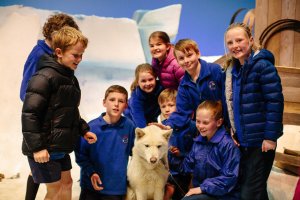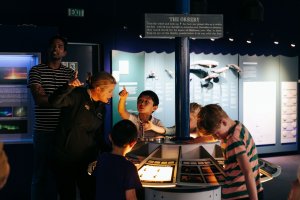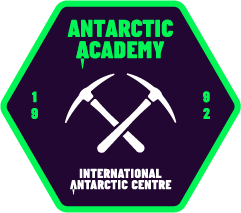International Antarctic Centre
Since the International Antarctic Centre (IAC) became a Learning Destination for Te Mātāpuna Mātātahi | Children’s University shortly after the programme started in New Zealand, the relationship has grown from strength to strength. Members have many exciting ways they can earn hours in their passport from them, including:
Visiting the International Antarctic Centre
CU members can visit the IAC and immerse themselves in an interactive, fun and exciting experience of Antarctica. From the minute they venture through the alluring icy entrance, they’ll be captivated by the magic that is, Antarctica.
Members and their families experience real snow and ice while surviving an indoor Antarctic storm. They can learn about life at Scott Base and see what it takes to work on the ice. Visit the Little Blue Penguins and snuggle in with huskies. There’s also the exciting Hägglund ride, an awesome 4D theatre, a massive HD screen and lots, lots more.
Attending a Holiday Programme
There is a range of holiday programmes guaranteed to excite, inspire and educate.
Being an Antarctic Penguin Keeper for a day, or attending the Husky Heroes Programme and Antarctic Aerospace Missions, are only some of the great opportunities members can earn stamps in their Passport for attending. 
Completing Online Activities
In response to Covid-19, The IAC team provided our members with 11 engaging online activities that could be completed at home. These popular activities allow members to explore a range of topics on Antarctica, including designing and building an Antarctic Base, learning about the Antarctic ecosystem, and building a Hägglund.
Attending a Campus Experience Event
The IAC team supported the Children’s University Campus Experience Event which saw hundreds of CU members attend Lincoln University for a fun-filled day of hands-on activities. The first activity the team ran was on the Little Blue penguin which are threatened by predators and human activity. Members learnt about their Penguin Rescue Centre and Penguin Keeper programme by designing and making their own Little Blue Penguin to take home and care for.
The second activity taught members how rockets are launched to provide satellites for the polar orbit above Antarctica, which look down and gain data from the Southern Oceans and the Antarctic Continent. They designed, built and testes a rocket which you can take home to show to your family and friends.
Kids in Space programmes
New programmes at the Antarctic Academy inspire the next generation of Antarctic and Space explorers with flight suits, space food, a real stardome and STEAM aerospace activities. The programme links technologies and testing for the poles of Earth, the Moon and Mars.
Antarctica is unlike any place on Earth; its extreme environment has been likened to the poles of Mars, and space agencies use Antarctica as an analogue to test out robots, equipment, hydroponics and astronaut survival training for space.
